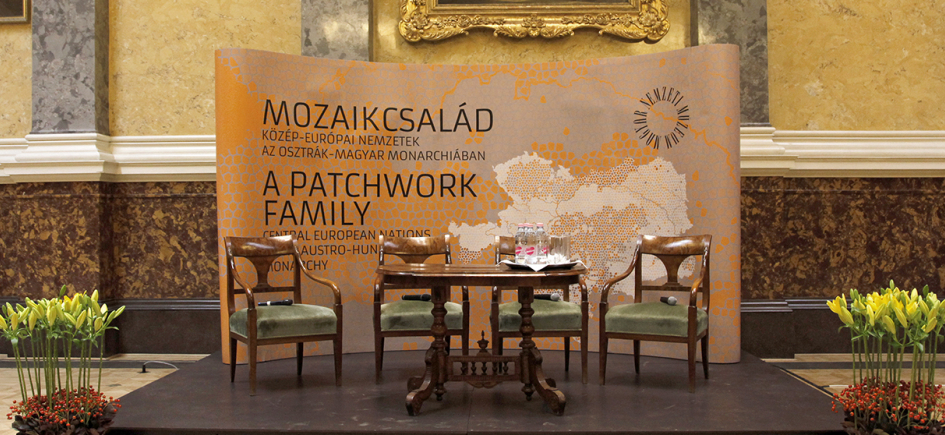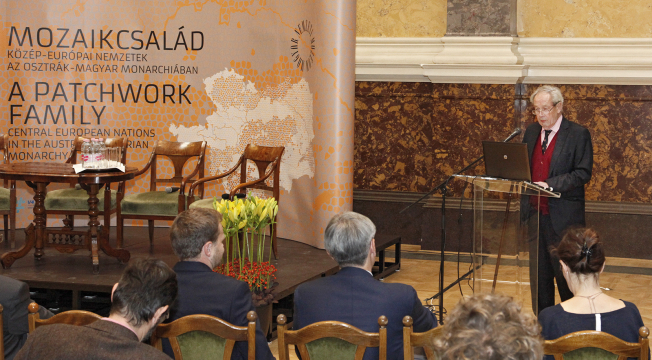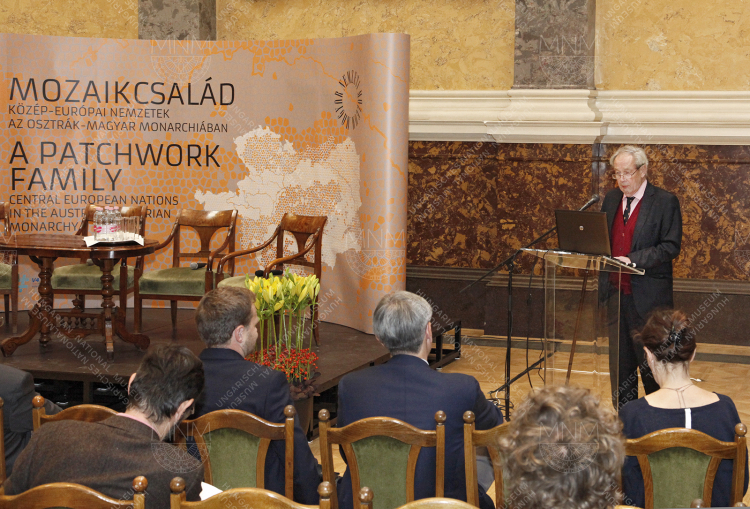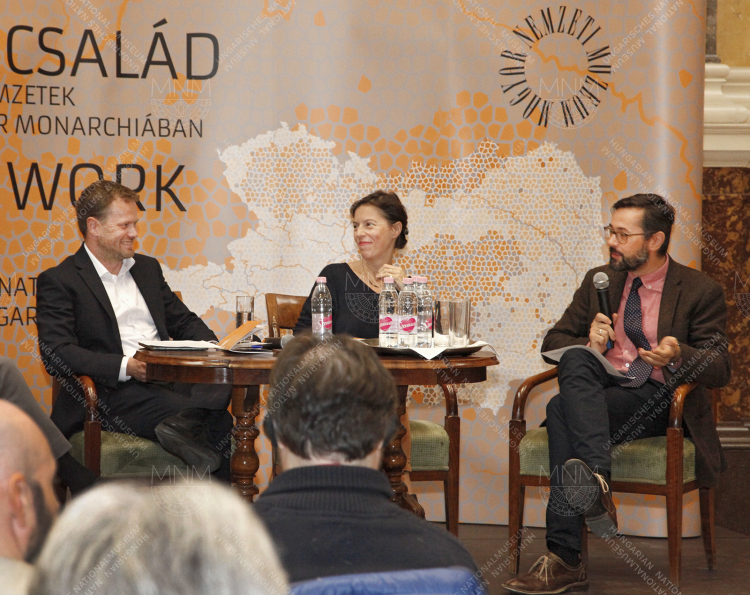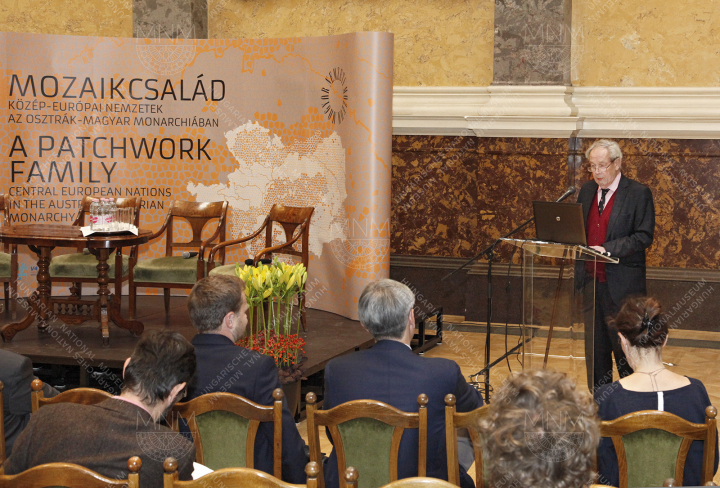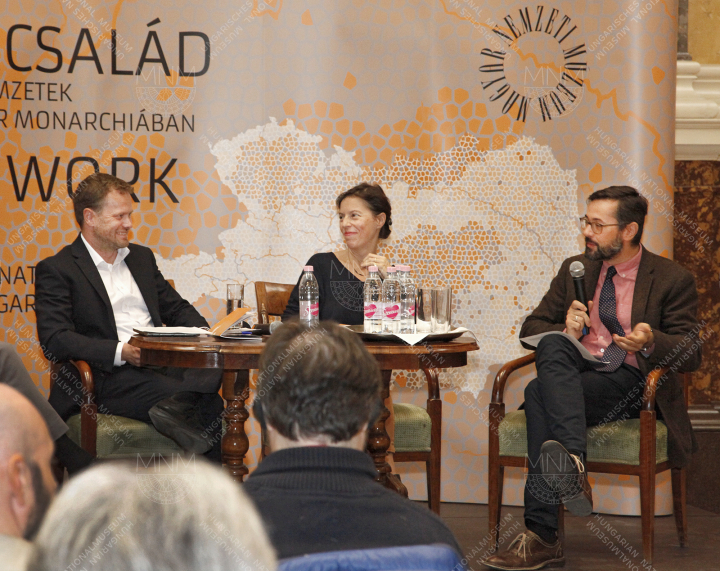
CENTRAL EUROPEAN NATIONS IN THE AUSTRO-HUNGARIAN MONARCHY
Roundtable Discussions
4-5 October 2018
Ceremonial Hall, Hungarian National Museum, Budapest
We are pleased to announce the conference titled ’A Patchwork Family – Central European Nations in the Austro-Hungarian Monarchy’ which will be held in the Hungarian National Museum. The upcoming conference will be dedicated to the national practices of historical memorialisation regarding Austria-Hungary. Our aim is to present the different ways national historiographies of the successor states have evaluated the period of the Austro-Hungarian Monarchy.
The conference provides an ideal academic platform for roundtable discussions. These seek to confront opinions of various historians from today’s nation states regarding social and cultural issues and international politics, capitalizing on the achievements and methodology of the past decades (e.g. the cultural turn). The discussions feature expert contributors from successor states and other European countries, yet they are also aimed at the general public, rather than an exclusively academic audience. Their goal is to make the results of recent academic research accessible for everyone.
If you wish to participate in the conference, please register through the following link until 1 October 2018:
Program
4 October 2018
9:30 Registration
10:00 Welcome Address
Benedek Varga, Director General, Hungarian National Museum
Keynote lecture: Multi-national constructs: can they be saved by
institutional reform? Some thoughts on present-day European
discontents and the lessons from Austria-Hungary
Prof Norman Stone, Oxford University
10:30 Roundtable discussion I:The Demise of the Austro-Hungarian
Monarchy and the Transformation of International Society
Moderator: Gergely Romsics, PhD, Hungarian Academy of Sciences,
Budapest
Invited contributors:
Isabelle Davion, PhD, Université de Paris-Sorbonne
John Paul Newman, PhD, Maynooth University, CoKildare
Vojislav G. Pavlović, PhD, Institute for Balkan Studies, Belgrade
The discussion will be held in English.
12:30 Lunch
5 October 2018
10:00 Roundtable discussion II: Cultures and Communities in the
Austro-Hungarian Monarchy
Moderator: Erika Szívós, PhD, Eötvös Loránd University, Budapest
Invited contributors
Bálint Varga, PhD, Hungarian Academy of Sciences, Budapest
Klaus Hödl, PhD, Graz University
Ondrej Ficeri, PhD, Slovak Academy of Sciences, Bratislava
The discussion will be held in English.
12:00 Lecture: Cultural Legacy of the Austro-Hungarian Empire
Prof András Gerő, Director General of the Institute of Habsburg History
12:30 Lunch
14:00 Roundtable discussion III: Modernisation and the nationalities
question
Moderator: Moderator: Iván Bertényi jr.,PhD, Collegium Hungaricum,
Vienna
Invited contributors
László Szarka, PhD, Hungarian Academy of Sciences, Budapest
ŽeljkoHoljevac, PhD, Zagreb University
Tamara Scheer, PhD, Vienna University
Károly Halmos, PhD, Eötvös Loránd University, Budapest
The discussion will be held in German.
Information:
Mészáros Balázs
meszaros.balazs@hnm.hu
+36 1 327 77 00/469
In spite of the independence ideal predominant in Hungarian national memory, the period of the Austro-Hungarian Monarchy – when Hungary renounced her sovereignty or at least part of it – is remembered with a kind of idealizing nostalgia. Years of La Belle Époque or the Golden Age are characterized by steady development, material and intellectual growth and solid, predictable civil values in our memory. But what does the same period recall in the memory of other nations of the Austro-Hungarian Monarchy?
In the course of a process extending as far as the end of the 20th century national states emerged in place of the multiethnic empire. These states sought to create and consolidate a national memory carrying the essence of identity. Within that ambition history and historiography took a decisive part according to the classic national program. Consequently it is also worth examining what part does the Austro-Hungarian Monarchy form in historical memory. How did and how do national histories of the states of the former monarchy view the dualist monarchy? What kind of possibilities did it offer and what kind of barriers did it pose for the national societies and growth of their culture?
Potential answers to these questions may obviously not be handled separately from national narratives, and it is not a purpose of these conference. The purpose is to throw light on the diversity, the parallels and contradictions characterizing the Central-European memory of the Austro-Hungarian Monarchy.
Our aim with the conference attended by experts from the successor states of the dual monarchy is to make the results of academic research of the past decades accessible to the general public clear and plain. This purpose is served by the chosen form of the event: discussion with the participation of the audience.
October 4
10:00 AM
Keynote lecture: Multi-national constructs: can they be saved by institutional reform? Some thoughts on present-day European discontents and the lessons from Austria-Hungary
NormanStone
Scotsman. He was Professor of Modern European History at Oxford (1984-97), then Professor of International Relations, Bilkent University, Ankara (1997-2017). He has written on modern European history, particularly the First World War. His first book, The Easten Front 1914-1917 (1974) won the Wolfson Prize and is kept in print by Penguin. He has been researching Hungarian history for the past four years.
10:30 AM
Roundtable discussion I.: The Demise of the Austro-Hungarian Monarchy and the Transformation of International Society
Austria-Hungary was very much a product of the 19th century balance of power politics. The Concert of Europe established during the Congress of Vienna required a Central European balancer against Prusso-German and Russian ambitions, and for most of the 1800s, a relatively strong Austria was desired by the Great Powers. Dualism was welcome by these same powers after 1867 because it was seen as rejuvenating a weakened state. Nationalism and the polarization of great power politics fundamentally altered the international political imaginaries of the early 20th century. What role did Austria-Hungary assume in these new imaginaries and how did the new norms and ideologies impact its fate?
Moderator: Gergely Romsics
Between 2007 and 2017 he was Associate Research Fellow and then Senior Research Fellow of the Institute for Foreign Affaires and Trade, between 2014 and 2017 he worked as the director of Hungarian Cultural Center in New York. At present he is Senior Research Fellow of the Research Centre for the Humanities Institute of History of the Hungarian Academy of Sciences and a lecturer of the Faculty of Social Sciences of the Eötvös Loránd University. His academic field is the history of diplomatic thinking and the collective memories in Hungary and in Central Europe.
He is the author of The Memory of the Habsburg Empire in German, Austrian and Hungarian Right-Wing Historiography and Political Thinking, 1918–1941. Highland Lakes, NJ: Atlantic Research and Publications, 2010.
Contributors
Isabelle Davion
She is Assistant Professor of the Contemporary History of East-Central Europe and German-speaking countries at Sorbonne University. She is also an executive committee member of the joint research group SIRICE (Sorbonne-Identities, International Relations and Civilizations in Europe), of the Center of Excellence EHNE (Writing a new History of Europe) and of the History office of the French Ministry of Defence.
She is the author of Mon voisin, cet ennemi (My Neighbour, My Enemy. French Security Policy facing the Polish-Czechoslovak Relations between 1919 and 1939) Peter Lang, 2009, awarded by the Institut de France. She has edited several collective books (Militaires et diplomates face à l’Europe médiane. Entre médiations et constructions des savoirs ( The Militaries and the Diplomats in Median Europe, Eur’Orbem, 2017) and has contributed to I.B. Tauris’ World War I in Central and Eastern Europe. Politics, Conflict and Military Experience (2018) and to Wiley-Blackwell ‘s Companion to Second World War.
John Paul Newman
He is Senior Lecturer of Twentieth-century European History at Maynooth University, Co Kildare (Ireland). Until September 2011 he was an ERC Postdoctoral Research Fellow working on the project Paramilitary Violence after the Great War, to which he contributed a case study of violence in the Balkans. Recently he has begun preparing a large research project on victorious societies and cultures of war victory in twentieth century Europe. He is also interested in the history of disability and disabled war veterans in Central Europe and the Balkans, and the comparative histories and historical trajectories of Yugoslavia and Czechoslovakia from 1918 to 1993.
His recent book is Yugoslavia in the Shadow of War: Veterans and the Limits of State-building 1903-1945. Cambridge: Cambridge University Press, 2017
Vojislav Pavlovic
He holds a PhD from University of Belgrade and also from Sorbonne University – Paris IV. He taught at the Universities of Belgrade, Limoges and at the American University of Paris. He was visiting professor at the University of Tours and at the Roma Tre University. At present he is Director of the Institute for Balkan Studies of Serbian Academy of Sciences and Arts in Belgrade. His research is focused on international relations of the Yugoslav space in the 20th century.
A recent book of his is De la France vers la Yougoslavie, Belgrade, Institut d’études balkaniques, 2015.
October 5
10:00 AM
Roundtable discussion II.: Cultures and Communities in the Austro-Hungarian Monarchy
Processes of modernization, urbanization, and shrinking geographical distances brought about new cultural phenomena and accelerated their dispersion. Besides the changes in clothing, fashion, nutrition, housing conditions, family patterns, and religious practices, new forms of social interactions and organizations – such as various forms of associations – emerged and spread all over the country. Also, recent historiography has paid special attention to the particular urban milieus of big cities where various ethnic and social groups developed new forms of coexistence and engaged in new forms of conflict, and where the transgression of boundaries between popular and elite culture was relatively easy. How did the cultural consequences of modernization processes manifest themselves in various regions and cities of the Habsburg Monarchy?
Moderator: Erika Szívós
She is Associate Professor of History and Chair of the Department of Economic and Social History at Eötvös Loránd University (ELTE). Her research interests cover a broad range of 19th- as well as 20th-century problems. Related to the cultural life of the Austro-Hungarian period she has published a monograph titled Social History of Fine Arts in Hungary, 1867-1918 (Boulder, Colorado: Social Science Monographs – Budapest: Institute for Habsburg History; distributed by Columbia University Press, 2011). Lately her main research field has been urban history, with a focus on historic centers and the transformation of their communities in the 19th and 20th centuries. She has been particularly interested in historic Jewish quarters in Budapest and other cities, investigating the ways World War II, the Holocaust, and later the Communist period affected local communities, local cultural milieus and the physical environment in these neighborhoods. Related to that field of interest, she also coedited the critical edition of a diary written in 1944-1945. She is currently working on a comparative project involving the histories of Central European capital cities after 1945.
A recent book of hers is Az öröklött város. Városi tér, kultúra és emlékezet a 19-21. században (The Inherited City. Urban Space, Culture and Remembrance in the 19th to 21th Centuries), Budapest: Budapest Főváros Levéltára, 2014.
Contributors:
Ondrej Ficeri
He is Research Fellow at the Centre of Social and Psychological Sciences of the Slovak Academy of Sciences in Košice since 2017. He graduated at Šafárik University in Košice and obtained his PhD title in history at Matej Bel University in Banská Bystrica. In his research he deals with interethnic relations in ethnically heterogeneous environments, more specifically with ethnonational transformation and nationalisation of the contested city Košice/Kassa during the 19th and 20th centuries.
In 2016, he published a monograph Košice v slovenskej historiografii (Košice in Slovak Historiography) in which he analyses the role the city played in Slovak national narrative in comparative and relational perspective to the position the city occupied in Hungarian historical culture.
Klaus Hödl
He is Associate Professor for History and associate research fellow at Centre of Jewish Studies at the University of Graz. He is interested in Eastern European Jewish history and Jewish popular culture. At present he is doing researches on space experiences of Central European Jews.
He is the author of Zwischen Wienerlied und Der Kleine Kohn: Juden in der Wiener populären Kultur um 1900 (Between Wienerlied and the little Kohn. Jews in the popular culture of Vienna around 1900) Göttingen: Vandenhoeck & Ruprecht, 2017.
Bálint Varga
He studied at Corvinus University, Eötvös Loránd University and Central European University of Budapest. He obtained his doctorate at Mainz University and Eötvös Loránd University. Since 2013 he is Associate Research Fellow at the Hungarian Academy of Science Research Centre for Humanities Institute of History. His research is focused currently on the history of Hungary in the age of the first globalization 1880-1914.
His recent book is The Monumental Nation: Magyar Nationalism and Symbolic Politics in Fin-de-siècle Hungary, Berghahn Books, 2016.
12:00 AM
Lecture: Cultural Legacy of the Austro-Hungarian Empire
András Gerő
He is director of the Institute of Habsburg History in Budapest and Professor Emeritus of Eötvös Loránd University. He’s been teaching at Eötvös Loránd University since 1977. Between 1981-1995 he was Associate Professor at the Department of Culture History. Since 1991 he has been Lecturer of Central European University. Between 1995 and 2017 he was the chair of the Department of Social and Economic History at Eötvös Loránd University Faculty of Humanities, meanwhile he was visiting fellow at several universities (Utrecht, Amsterdam, Pennsylvania University, Columbia University). In 2002 he was appointed director of the Institute of Habsburg History in Budapest. His research is focused on the Austro-Hungarian Empire period, on modernisation, symbolic politics and the history of Budapest.
His recent English book is A Hungarian National History Book, Budapest: Public Foundation for the Research of Central and East European History and Society, 2015.
2:00 PM
Roundtable discussion III.: Modernisation and nationalities question
Analyses of social history on the Austro-Hungarian Monarchy era lay an emphasis mostly on changes. Historical narratives are dominated by phenomena of modernization like demographic change, the prevalence of wage labour, migration and urbanization.
It is also a part of these changes that earlier ethnic controversies were filled with new elements supported by nationalism. National movements, rather asynchronous in their evolution, have devised national political purposes which lead to political conflicts. But what are the relations, parallels and differences in the national movements, forms of nationalisms of the period? And what similar or dissimilar meanings were later attributed to the era of the Austro-Hungarian Monarchy?
Moderator: Iván Bertényi, Jr.
Between 2000-2009 he was Assistant Lecturer at the Faculty of Humanities of Pázmány Péter University. Since 2009 he has been a senior lecturer at the Department of Cultural History of the Faculty of Humanities of Eötvös Loránd University. In 2012 and 2013 he was Visiting Lecturer at Indiana University. Since 2013 he has been Senior Research Fellow at of the Research Centre for the Humanities Institute of History of the Hungarian Academy of Sciences. Currently he is deputy manager for science at Collegium Hungaricum in Vienna. His research is focused on Hungarian political and cultur history in the 19th and 20th century, nationalism and ethnic politics.
He is the author of Propaganda – politika, hétköznapi és magas kultúra, művészet és média a Nagy Háborúban. (Propaganda – politics, popular and high culture, art and media in the Great War) Országos Széchényi Könyvtár, Budapest, 2016.
Contributors
Tamara Scheer
Since 2009 she has been Lecturer at the Institute for Eastern European History and Institute for Modern History of the University of Vienna. From 2010 to 2012 she got a research fellowship at the Faculty of Central European Studies of Andrássy University, Budapest. From 2013 to 2017 she was Associate Research Fellow at Ludwig Boltzmann Institute. She currently leads the project of the language problem in the Austro-Hungarian army as part of the nationalities conflicts within the Habsburg Empire.
Her recent book is „Minimale Kosten - absolut kein Blut“: Österreich-Ungarns Präsenz im Sandschak von Novi Pazar (1879-1908), („Minimal costs – absolutely no blood“: Austria-Hungary’s Presence in the Novi Pazar Sandzak 1879-1908) Frankfurt am Main: Peter Lang GmbH, Internationaler Verlag der Wissenschaften, 2013.
Željko Holjevac
He studied history at the Faculty of Humanities and Social Sciences, University of Zagreb, where he received his PhD degree 2006. From 1998 to 2007 he was employed as Assistant at the Ivo Pilar Institute of Social Sciences in Zagreb. Since 2007 he has been at the Department of History, Faculty of Humanities and Social Sciences, University of Zagreb, currently as Full Professor. He served as Vice-Dean for Organisation and Development, and in the academic year 2016-17 he was Interim Dean of the Faculty of Humanities and Social Sciences. The focus of his academic activity is the Croatian history of the Early Modern Period and the nineteenth century in European context, especially the history of Croatian-Hungarian relations at that time. Currently, he is the head of the Society for Croatian History and member of the Organizing Committee of the International Cultural Historical Symposium Mogersdorf.
He edited the book 1918. u hrvatskoj povijesti, (1918 in the Croatian history) Zagreb: Matica hrvatska, 2012.
László Szarka
He graduated at Comenius University, Bratislava. Between 1977 and 1985 he was Research Assistant of the research group of the Czechoslovak Academy of Science in Budapest. From 1986 to 1995 he was an associate research fellow of the Institute of History of Hungarian Academy of Science (MTA), later interim head of department. From 2001 to 2011 he was Senior Research Fellow of the Institute of Minority Studies of MTA and at present he works at the Institute of History of MTA. From 2009 to 2012 he was the dean of Selye János University in Komarno. Since 1998 he has been co-president of the Slovak-Hungarian Historian Committee. His research is focused on the history of the Hungarian minority and the Czechoslovak-Hungarian relations in the 20th century.
Hs recent book is A multietnikus nemzetállam. Kísérletek, kudarcok és kompromisszumok Csehszlovákia nemzetiségi politikájában, 1918–1992 (A multi-ethnic national state. Czechoslovak ethnic politics 1918-1992) Pozsony: Kalligram, 2016.
Károly Halmos
He graduated in economy and received his degrees both in economic history and history. He is Associate Professor at the Department of Economic and Social History of the Faculty of Humanities of Eötvös Loránd University. His academic interest lies in business history, the social history of great entrepreneurs and also in conceptual history and historiography. His recent research focused on the history of the business life victims of the crisis year 1869.








